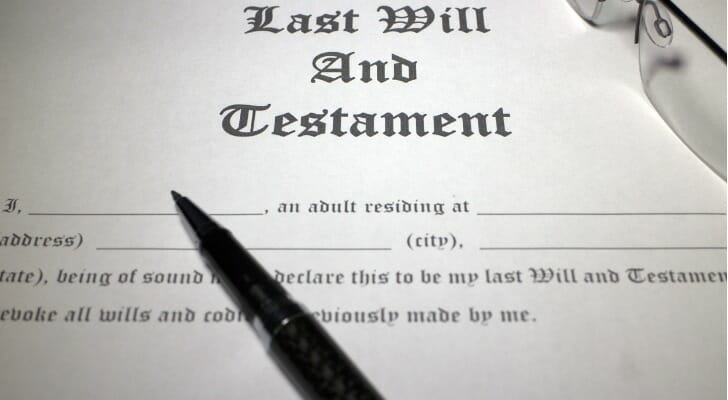A will is a basic tool of estate planning that tells your survivors what you want to be done with your possessions. Wills are legal documents and many are drafted by attorneys, but it is possible to make a will without a lawyer. Options for making a will without an attorney include writing your own from scratch, filling out a template, using will-writing software and using online will-creation tools. Making your own will without an attorney can save on legal fees but at the risk of making an error that could cause additional cost and complexity in the job of eventually settling your estate. If you're not sure how to approach estate planning, a financial advisor can help.
A will, also called a last will and testament, is used in estate planning to guide the disposition of your assets after you die. A will is typically written by an attorney to make sure that all your wishes are explained clearly and in such a way that they will have legal force.
For wills addressing large or complex estates, the assistance of an attorney is generally considered to be advisable. A confusing, poorly written will that doesn't conform to the rules of the state may cause a number of potentially costly and time-consuming difficulties. If contested by beneficiaries who contend it doesn't clearly express your wishes, for instance, resolving the matter could require a lengthy and expensive court case.
For simple and small estates, however, a will you write yourself can function as well as one made with the help of an attorney. The basic function of a will is to assign someone to act as executor, describe the property in the estate and identify people or other entities who will receive your property. If minor children are involved, the will can direct someone to act as guardian and shoulder the children's care.
How to Make a Will Without a LawyerWhile wills are typically drafted by lawyers, many people write legally enforceable wills without the help of an attorney. If you want to make a will without an attorney, here is what to do:
- Follow the rules: Make sure you will fulfill your state's minimum requirements for valid wills. State laws govern wills and details such as the requirement for witnesses when signing vary from state to state. You can read up on your state's rules at the website for the state or its court system. Alternatively, many tools for writing wills, including those described below, are tailored to individual states and will help ensure your will is valid.
- Create your own: If you feel you know what your state calls for, you can write your own will starting with a blank sheet of paper. The basic requirements are generally that you identify yourself and state that this is your will, describe how and to whom you want your property distributed and name someone to serve as executor. A handwritten or holographic will should be entirely in your own handwriting. The will must always be dated and signed, preferably before witnesses. This sort of do-it-yourself will cost nothing and can be as legally enforceable as one created with an attorney as long as it fulfills the essential elements.
- Use a template: Rather than start from scratch you may prefer to use a template. These fill-in-the-blank wills can be downloaded for free or for a nominal fee from many websites. Templates are typically tailored for individual states and cover the bases better than a free-form will.
- Consider will-creation software: You can get an added layer of customization by using will-writing software. Quicken Willmaker & Trust is one example of a program that for as little as $99 will guide you through creating a will, as well as other estate planning documents such as healthcare directives.
- Try an online tool: There are a number of online tools that can write a will using the information you input in response to prompts. Some of these, such as FreeWill, are completely free for individual personal use.
When you've created your will, don't neglect to sign it in front of witnesses and date it. These safeguards can help reduce the chances of the will being contested or ruled invalid. As an alternative to going it entirely alone you may want to ask an attorney with experience in estate law to review the will you have created. Some attorneys will review wills for a discounted fee.
Other Considerations When Making a Will Without a LawyerSaving money on legal fees is the main reason for making a will without a lawyer. An attorney may draft a simple will for $200 or so, although more complex estates could call for extensive consultations billed at an hourly rate that could total thousands of dollars before the will is complete.
On the downside, an unclear will or one with errors can also be costly. For instance, relying on an accidentally unsigned or undated will is essentially the same as dying intestate, since the court is not likely to recognize the will as valid. If that happens, your property will be disposed of according to the laws of the state rather than following your wishes.
The Bottom LineYou may be able to write a will that will stand up in court without an attorney. This is most likely to work if you have a small or simple estate and don't expect anyone to contest it. You potentially can save on legal fees this way but may need to invest time and energy researching your state's laws. Using a template, will-making software or will-creation website can make the process easier and improve the outcome.
- A financial advisor can answer your estate planning questions and help you create the right plan for your assets. Finding a financial advisor doesn't have to be hard. SmartAsset's free tool matches you with up to three vetted financial advisors who serve your area, and you can interview your advisor matches at no cost to decide which one is right for you. If you're ready to find an advisor who can help you achieve your financial goals, get started now.
- The desire to control how your assets will be disposed of after your death is common, but the rules controlling how this happens can be complicated. How your inheritance will work depends on whether you have a will, how many and what kind of debts you leave behind, whether or not your state levies inheritance taxes and more.
Photo credit: ©iStock.com/kate_sept2004, ©iStock.com/Hailshadow, ©iStock.com/RichLegg
The post How to Make a Will Without a Lawyer appeared first on SmartAsset Blog.
The views and opinions expressed herein are the views and opinions of the author and do not necessarily reflect those of Nasdaq, Inc.





